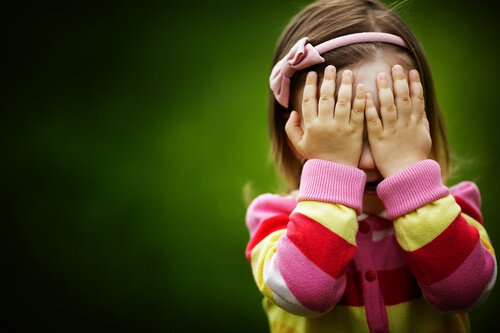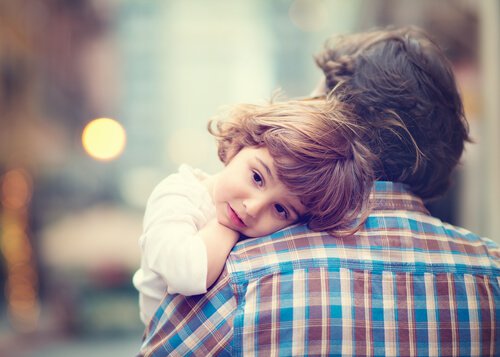7 Uncomfortable Emotions Children Should Be Taught How to Process


Reviewed and approved by the psychologist Gema Sánchez Cuevas
It is impossible to keep uncomfortable emotions off to the side and out of sight. Adults can’t do it, and children shouldn’t either. Although we may want to put these emotions in a bubble as a way of preventing anyone from suffering from them, doing that would be completely counterproductive.
Many parents insist on shielding their children from experiencing uncomfortable emotions. In the long run, this is not helpful. At some point in time, all children will have to confront difficult situations. They will be faced with pain, and with frustration. Rescuing them as children will only make their adult lives more difficult.
We should not protect children from uncomfortable emotions, but rather teach them how to process them correctly when they arise. Children need to learn how to cope with uncomfortable emotions in a healthy way.
How to help children deal with uncomfortable emotions
Although it is not an easy task, teaching children how to deal with pain, rage, and other emotions will prepare them for life. These uncomfortable emotions will become more and more intense as they grow up. Learning to confront them from an early age will facilitate a process in which they can adapt and mature.
Training children to know how to cope with their emotions is the best form of preparing them to confront the responsibilities and disappointments of adult life.
Teaching children to cope with boredom
Boredom is something that can affect anyone. However, children are more prone to feeling bored and to demanding attention. This does not mean, though, that whenever a child is bored, an adult must resolve it. Furthermore, it is good for children to feel bored every now and then.
In children, boredom stimulates their innate ability to be creative. For this reason, a child trying to figure out what to do with their time should be encouraged to do it themselves, and not be offered constant entertainment.
Children must be encouraged to face boredom proactively, and to think in a positive way about what they can do to resolve it.
Teaching children to cope with frustration
Wanting to help a child when they feel frustrated is a natural reaction. However, children need to know how to cope with that frustration independently and effectively. There will not always be someone there to do it for them, so they must learn to confront a frustrating situation on their own.
If a child struggles with their homework, with solving a puzzle, with putting something together, or anything they may have trouble doing, the answer is not to do it for them. This will only cause them to grow up frustrated, and unable to solve things on their own.
In these cases, an adult (teacher, parent, etc…) should talk to the child, calm them down, and encourage them to find the solution on their own. By doing this, the child will learn that to resolve a frustrating situation, they must first calm down.
If a child doesn’t have the opportunity to resolve their problems on their own, they may develop a feeling of learned defenselessness. In other words, they will grow up convinced that they need others to solve their problems for them.
Teaching children to cope with sadness
Sadness is an emotion that is constantly present throughout life. It is normal for it to emerge as a result of certain events or situations. Children should learn how to identify sadness and to know that it is normal, and that it happens to everyone.
A child should learn that in life, not everything is happiness and fun. A child should be allowed to experience their sadness naturally. This will help them to feel better about themselves and their feelings. As novelist Jose Ignacio Cordero expresses through one of his characters in The Barber of the Blue Division (El peluquero de la División Azul), it is not that sadness is bad, only that it is seen badly.
Teaching children to cope with anxiety
It is not healthy for children to experience constant anxiety. However, it is important for them to be able to recognize when they feel anxious, and what kinds of situations unleash this uncomfortable emotion. That is the only way in which they can learn to identify and process it.
They should also learn to confront the fears that anxiety can generate. They should learn to discover that this emotion does not have to block them reaching their objective, whether it be asking for a new toy, or getting a good grade on a test.
When a child is anxious, it is important to help them understand what they are feeling and to teach them to calm themselves down. Sometimes it is necessary to let them externalize their anxiety to be able to show them what they are going through and help them overcome their fears. Repressing these feelings does not solve anything.
Teaching children to cope with disappointment

Disappointment is often felt by children for a variety of reasons. Most of these reasons are uncontrollable. Maybe their team lost a game, they cannot find their favorite candy at the store, their friend is put in a different group than they are, or their mother or father comes home late and can’t play with them. The list could go on and on.
No matter what the reason may be, disappointment is an emotion a child will experience throughout life, and one that they must learn how to process. If not, they might live in a constant state of feeling like every little disappointment is the end of the world.
Not letting children feel disappointment or constantly making up for any disappoint will only make them impulsive and selfish.
Teaching children to cope with anger
Anger is not a bad emotion. It only becomes bad when we don’t know how to deal with it. Children need to learn healthy ways to cope with anger and other similar emotions. Responding to these emotions with aggression is neither healthy nor necessary.
When a child is angry, they must be taught how to calm themselves down physically by taking deep breaths and waiting. Counting to ten is strategy that works for both kids and adults. It allows them to take a step back and get a hold of the situation.
Teaching children to cope with guilt
It is not possible to accept every excuse and always allow a child to be free of guilt. Children should learn to recognize the fact that their behavior affects others, and that an excuse or apology does not change that. They shouldn’t be made to feel embarrassed by their behavior, but rather be shown how to feel the responsibility of their actions in a way that can create constructive changes in their behavior.
If a child’s excuse is always accepted, and they are never taught to recognize their guilt and responsibility, the child will never learn that their actions can hurt those around them.
It is impossible to keep uncomfortable emotions off to the side and out of sight. Adults can’t do it, and children shouldn’t either. Although we may want to put these emotions in a bubble as a way of preventing anyone from suffering from them, doing that would be completely counterproductive.
Many parents insist on shielding their children from experiencing uncomfortable emotions. In the long run, this is not helpful. At some point in time, all children will have to confront difficult situations. They will be faced with pain, and with frustration. Rescuing them as children will only make their adult lives more difficult.
We should not protect children from uncomfortable emotions, but rather teach them how to process them correctly when they arise. Children need to learn how to cope with uncomfortable emotions in a healthy way.
How to help children deal with uncomfortable emotions
Although it is not an easy task, teaching children how to deal with pain, rage, and other emotions will prepare them for life. These uncomfortable emotions will become more and more intense as they grow up. Learning to confront them from an early age will facilitate a process in which they can adapt and mature.
Training children to know how to cope with their emotions is the best form of preparing them to confront the responsibilities and disappointments of adult life.
Teaching children to cope with boredom
Boredom is something that can affect anyone. However, children are more prone to feeling bored and to demanding attention. This does not mean, though, that whenever a child is bored, an adult must resolve it. Furthermore, it is good for children to feel bored every now and then.
In children, boredom stimulates their innate ability to be creative. For this reason, a child trying to figure out what to do with their time should be encouraged to do it themselves, and not be offered constant entertainment.
Children must be encouraged to face boredom proactively, and to think in a positive way about what they can do to resolve it.
Teaching children to cope with frustration
Wanting to help a child when they feel frustrated is a natural reaction. However, children need to know how to cope with that frustration independently and effectively. There will not always be someone there to do it for them, so they must learn to confront a frustrating situation on their own.
If a child struggles with their homework, with solving a puzzle, with putting something together, or anything they may have trouble doing, the answer is not to do it for them. This will only cause them to grow up frustrated, and unable to solve things on their own.
In these cases, an adult (teacher, parent, etc…) should talk to the child, calm them down, and encourage them to find the solution on their own. By doing this, the child will learn that to resolve a frustrating situation, they must first calm down.
If a child doesn’t have the opportunity to resolve their problems on their own, they may develop a feeling of learned defenselessness. In other words, they will grow up convinced that they need others to solve their problems for them.
Teaching children to cope with sadness
Sadness is an emotion that is constantly present throughout life. It is normal for it to emerge as a result of certain events or situations. Children should learn how to identify sadness and to know that it is normal, and that it happens to everyone.
A child should learn that in life, not everything is happiness and fun. A child should be allowed to experience their sadness naturally. This will help them to feel better about themselves and their feelings. As novelist Jose Ignacio Cordero expresses through one of his characters in The Barber of the Blue Division (El peluquero de la División Azul), it is not that sadness is bad, only that it is seen badly.
Teaching children to cope with anxiety
It is not healthy for children to experience constant anxiety. However, it is important for them to be able to recognize when they feel anxious, and what kinds of situations unleash this uncomfortable emotion. That is the only way in which they can learn to identify and process it.
They should also learn to confront the fears that anxiety can generate. They should learn to discover that this emotion does not have to block them reaching their objective, whether it be asking for a new toy, or getting a good grade on a test.
When a child is anxious, it is important to help them understand what they are feeling and to teach them to calm themselves down. Sometimes it is necessary to let them externalize their anxiety to be able to show them what they are going through and help them overcome their fears. Repressing these feelings does not solve anything.
Teaching children to cope with disappointment

Disappointment is often felt by children for a variety of reasons. Most of these reasons are uncontrollable. Maybe their team lost a game, they cannot find their favorite candy at the store, their friend is put in a different group than they are, or their mother or father comes home late and can’t play with them. The list could go on and on.
No matter what the reason may be, disappointment is an emotion a child will experience throughout life, and one that they must learn how to process. If not, they might live in a constant state of feeling like every little disappointment is the end of the world.
Not letting children feel disappointment or constantly making up for any disappoint will only make them impulsive and selfish.
Teaching children to cope with anger
Anger is not a bad emotion. It only becomes bad when we don’t know how to deal with it. Children need to learn healthy ways to cope with anger and other similar emotions. Responding to these emotions with aggression is neither healthy nor necessary.
When a child is angry, they must be taught how to calm themselves down physically by taking deep breaths and waiting. Counting to ten is strategy that works for both kids and adults. It allows them to take a step back and get a hold of the situation.
Teaching children to cope with guilt
It is not possible to accept every excuse and always allow a child to be free of guilt. Children should learn to recognize the fact that their behavior affects others, and that an excuse or apology does not change that. They shouldn’t be made to feel embarrassed by their behavior, but rather be shown how to feel the responsibility of their actions in a way that can create constructive changes in their behavior.
If a child’s excuse is always accepted, and they are never taught to recognize their guilt and responsibility, the child will never learn that their actions can hurt those around them.
This text is provided for informational purposes only and does not replace consultation with a professional. If in doubt, consult your specialist.









